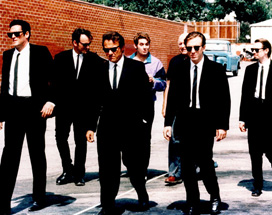Viking Night: Reservoir Dogs
By Bruce Hall
January 25, 2011
Mr. Pink is a social elitist with a very ordered mind. Mr. White is an old timer whose sense of personal honor sometimes trumps his professionalism. Mr. Blonde (Michael Madsen) is a nut job nihilist who couldn’t care less who he takes down with him. We know these things because we are shown intermittent vignettes about each man that give us a little insight into the character, but generally do not propel the main events of the film forward. I’m not suggesting that this is an inappropriate way to tell a story. It is very appropriate, and works a hell of a lot better here than it does in Pulp Fiction. But in the hands of a master storyteller like Martin Scorsese, we’d find that the meal served contains more meat then gristle. And while gristle tastes good, trying to make dinner out of it is just going to leave you tired, but still hungry.
A non-continuous story line full of crafty wordplay can be a very powerful narrative tool, but in Tarantino’s hands it is all too often a shortcut meant to add ballast to a lightweight script. The result here isn’t quite as distracting as it is in his later films; Tarantino’s reputation for witty, informative dialogue is well deserved. But allowing your characters to spend too much of a movie’s run time engaged in the sort of pithy back and forth you’d expect to see at a freshman year house party doesn’t constitute character development. QT has also earned his reputation as a knowledgeable film buff but speaking of Scorsese, there’s a fine line between inspiration and homage. In fact, Tarantino has been known to blunt criticism that he hems too closely to his idols by saying just that. But a room full of mobsters sitting around disparaging blacks and Jews over drinks is not just derivative; it simply doesn’t work here, and that’s what really makes it uncomfortable to listen to. Rather than feeling like an insider’s interpretation of gangster life, Tarantino’s words occasionally sound like an affectation designed to push his own adolescent, hyperkinetic thoughts and opinions on his audience. Don’t misunderstand me; I don’t want to get sued any more than I want my car set on fire. I am not here to claim that Quentin Tarantino is a prejudiced man. I’m basically just saying that “homage” is often a code word for “lazy storytelling”, and that Tarantino is not always as clever and witty as he thinks he is.
But are any of us? The creative process is a highly subjective one, so if it sounds like I’m leaning toward dismissing him as a film maker, I’m not. On the one hand, Reservoir Dogs definitely contains both Tarantino’s best and worst tendencies. But he shows tremendous restraint as a first time filmmaker, focusing on his goals and resisting the urge to be unnecessarily gimmicky. I’ll use this chance to publicly thank him for not busting out a dolly zoom, and for keeping the slow motion to a minimum. And even though it doesn’t always work, the out of sequence plot really does give us a window into most of the relevant characters. Mr. Pink’s regimented view of human behavior may be unrealistic, but in a line of work where a strict code of honor defines everything it has allowed him to excel. Mr. Orange is the likable guy that everyone wants on their team because he comes across as winner, and there’s a compelling reason for it. And Mr. White seems less like a killer than he does a good bartender, so despite his years of experience you get the idea he’s been in the wrong line of work all along. And despite all his protestations of wisdom, Mr. Blonde comes to discover that Matthew 26:52 is the only thing a guy like him really needs to know.
In the vacuum that usually follows chaos, people tend to fall into a natural hierarchy based on the personality and moral base of each individual. Being able to see how each man is put together – outside of the narrative itself – goes a long way toward legitimizing their behavior in the context of events leading up to the film’s climax.
In case you’re wondering, the point of spending so much time mentioning Pulp Fiction in a discussion of Reservoir Dogs is because both movies are similar in structure and therefore tend to benefit and suffer from the same issues. It’s almost as though once he had the budget and the clout to remake his first movie the way he’d really wanted to, he decided to simply take another stab at it, but with a slightly different story. But that’s just my own speculation. What’s true is that in the years since, Quentin Tarantino has grown as a film maker. He’s still using the same old tricks, and he’s still prone to the same mistakes but he’s become a slightly better storyteller, and with each film he’s made they’ve almost all been the better for this. And a quick word of warning – violence is a big part of the Tarantino-verse, and it isn’t any different in this movie.
But if you have a problem with bloodshed, I’d suggest that you avoid movies about mobsters in the first place. Reservoir Dogs should be better than it is, but it is still far better than it could have been. And that’s a tip of the hat to its director. But most of all, it’s an illuminating window into the brain of a very flawed but very intelligent film maker who in the years since has evolved – love him or hate him – into one of the most important and influential voices in cinema today.
Continued:
1
2
3
|
|
|
|




